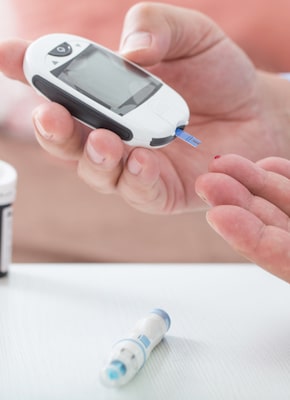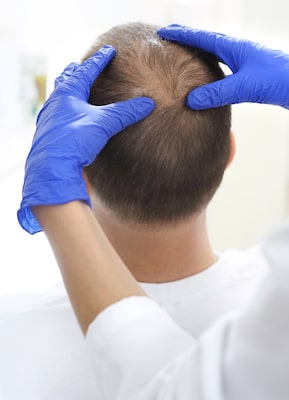Hair Loss and Diabetes is there a Connection?
Hair loss as a possible side effect of diabetes is rarely discussed. Most likely because of the other more damaging side effects, like the risk of losing eyesight or damaged nerves. And the loss of hair may seem less significant or viewed as a vanity issue.
Diabetes is a chronic disease that can cause elevated blood sugar (glucose) levels to occur in the body. Excess sugar in the blood can damage vital organs such as the heart, kidney, eyes, skin, and hair follicles. When there are high glucose levels in the blood, small blood vessels are damaged, causing a lack of oxygen needed to help nourish organs and tissue in the body.
The skin is the body’s largest organ. Hair and nails derive from the skin making up the integumentary system. For this system to work correctly, it needs blood rich in oxygen and nutrients. People living with diabetes have a higher risk of damaged blood cells, disturbing hair growth, which could lead to hair loss.
Damaged blood vessels and improper blood flow related to having diabetes are some of the possible theories and causes that could lead to hair loss associated with having diabetes.
In this article, we will share the possible causes of hair loss and diabetes and uncover ways to restore hair loss.
Which Type of Diabetes may be related to Hair Loss?
 There are two types of diabetes- type 1 and type 2. Both types of diabetes are diseases that affect the way a person regulates blood sugar or glucose. Glucose is needed to fuel a body’s cells and to create energy. The body needs insulin to help regulate blood sugar levels, but both types of diabetes have challenges producing insulin for the body.
There are two types of diabetes- type 1 and type 2. Both types of diabetes are diseases that affect the way a person regulates blood sugar or glucose. Glucose is needed to fuel a body’s cells and to create energy. The body needs insulin to help regulate blood sugar levels, but both types of diabetes have challenges producing insulin for the body.
People with type 1 diabetes can’t produce insulin because their immune system attacks the cells that make it.
People with type 2 diabetes resist the insulin produced by the body, meaning the body doesn’t properly use insulin to help regulate blood sugar levels.
Both types of diabetes lead to chronically high blood sugar levels in different ways. One is a deficiency with the immune system, and the other absorption of blood sugar by cells, causing abnormal spikes.
In theory, high blood sugar levels can lead to damaged blood vessels, and without healthy oxygen-rich blood vessels, your body cannot nourish vital organs, such as your skin and hair follicles.
It has been reported that some types of hair loss conditions are more associated with specific types of diabetes.
Alopecia and Diabetes- Is There a Connection?
Among all types of hair loss conditions, there have been studies and reports associating diabetes with androgenetic alopecia and alopecia areata. Each kind of alopecia affects the hair in different ways.
Androgenetic Alopecia
 Androgenetic alopecia or male pattern baldness is the miniaturization of hair follicles due to their sensitivity to one type of male hormone called dihydrotestosterone (DHT). Women can also be affected by androgenetic alopecia. However, the type of baldness in women is different from that of men. Thinning hair in women can start at the top of the head, from the parting line. Elevated levels of DHT in hair follicles and blood can cause a shorter hair growth cycle and can change the characteristics of the strands thinner.
Androgenetic alopecia or male pattern baldness is the miniaturization of hair follicles due to their sensitivity to one type of male hormone called dihydrotestosterone (DHT). Women can also be affected by androgenetic alopecia. However, the type of baldness in women is different from that of men. Thinning hair in women can start at the top of the head, from the parting line. Elevated levels of DHT in hair follicles and blood can cause a shorter hair growth cycle and can change the characteristics of the strands thinner.
People suffering from androgenetic alopecia are typically prescribed FDA-approved medication such as minoxidil or finasteride. Both medications can take months to start seeing the appearance of hair due to the slow growth of hair follicles. However, severe cases of androgenetic alopecia may not be reversed by medical treatment, and other treatments such as a hair transplant may be required.
Studies have been conducted associating androgenetic alopecia with metabolic syndrome, a collection of conditions including high blood sugar related to type 2 diabetes.
Alopecia Areata
Alopecia areata is an autoimmune disease in which your immune system attacks the hair follicles, delaying the cycle of hair growth that can lead to hair loss. Unlike the hair loss pattern from androgenetic alopecia, hair loss with alopecia areata is usually patchy, coin-shaped, and limited to small areas. Alopecia areata is typically a self-recovering condition, meaning hair follicles affected by the disease can regrow with no intervention, and a patient can see hair growth within a few months from the beginning of hair loss.
If a patient does not have a full recovery in a few months, more aggressive treatments might be needed, such as local injections of corticosteroids.
People living with diabetes also have been associated with alopecia areata. This association has been more clearly describing with patient with diabetes type I. These patients may present with the more severe types of alopecia areata that involves hair follicles in the entire body aka alopecia Universalis.
Can Your Hair Grow Back After Hair Loss from Diabetes?
If you are a person living with diabetes and suffering from hair loss, consult with a hair specialist who can examine your hair and scalp to confirm the diagnosis. If you have diabetes and your doctor determines that it affects your hair, the essential step for hair recovery is to manage your blood sugar levels. Managing your diabetes and getting it under control with a combination of medications, a healthy diet, and exercise can help support the healthy blood flow your scalp needs to promote hair growth.
Suppose you meet your diabetes goal, maintain your glucose levels consistently, and still suffer from hair loss. In that case, your doctor may need to evaluate the other possibilities and to help rule out any other underlying causes.
Other Ways to Restore Your Hair
If you have met all of your requirements to control your diabetes and are not receptive to taking medication to address the hair loss, then a consultation for a hair transplant may be indicated.
A hair transplant involves harvesting more permanent hair follicles from a donor area, such as the back or sides of the head, and implanting them in the balding areas. The results are considered to be lifelong if the donor’s hair is appropriately selected.
The Final Takeaway
Diabetes is a chronic disease that can have a wide range of side effects on the entire body, and hair loss associated with diabetes should not be ruled out, even though there isn’t a definitive correlation. If you have noticed abnormal hair loss and are diabetic, make sure to consult with your doctor for a complete diagnosis.